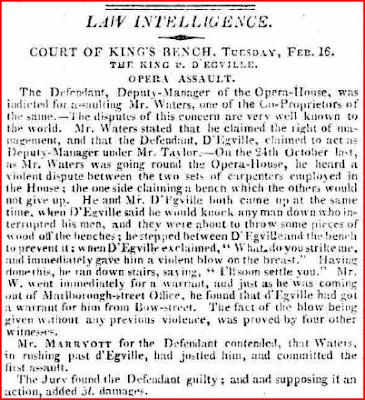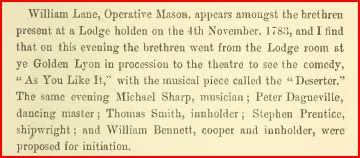You will notice that Miss d'Egville appears twice on the billing. While admitting the possibility of other explanations it seems likely that these are Sophie and Fanny. This is three years after Peter d'Agueville's auction was forced by relocation from Ipswich in 1792.
The capitalisation is copied directly from the magazine so it is interesting that while Georges' name appears in small capitals neither of the Misses d'Egville merit this billing. Perhaps it was almost time to try something new for Sophie.
It is worth reading some of the other articles in the Freemasons' Magazine for February 1795 because they give a real sense of the instability in the Europe for which Sophie was shortly to embark. A good analogy might be that one decides to go and get a job in Paris some time after Dunkirk in 1940.
Feb. 12. The long-expected heroic Pantomime of D'egville's—"Alexander The Great, or, The Conquest OF Persia," made its entre at Drury-laneTheatre.In this Ballet, which certainly exceeds every thing of the kind ever exhibited on an English Theatre, the magnificent splendour of scenery and decorations are happily and ingeniously blended with all that strength of interest which fine action must ever excite. The characters are as follow:
MACEDONIANS.Alexander, - - Mr. J. D'Egville.Hephestion, - - Mr. Aumer.Clytus, - - Mr. Dubois.Perdiccas, - - Mr. Fairbrother.Parmenio, - - Mr. Phillimore.Ptolemy, - - Mr. Caulfield.Attalus, - - Mr. Benson.Eumenes, - - Mr. Bland.Philip, - - Mr. G. D'Egville.Officers, Guards, Attendants.AMAZONS.Thalestris, - - Mrs. Fialon,
Miss Collinse, Miss Heard, Miss D'Egville, Miss Redhead, Miss Stagledoir. Miss Stuart, Miss.Tidswell, Mrs. Bramwell.
PERSIANS.
Darius, - - Mr. Fialon.Son of Darius, - - Master Menace.Oxathres, - - Mr. Boimaison.Memnon, - - Mr. Webb.Arsites, - - Mr. Maddocks.Spithridates, - - Mr. Banks,Raesaces, - - Mr. Lyons.Sysigambes, - - Mrs. Coyler.Parisatis, - - Mrs. Hedges.Artemisia, - - Mrs. Butler.Statira, - - - Miss J. Hillisberg.High Priest of the Sun, Mr. Roffey.Satraps.Mr. Kelly, jun. Mr. Evans, Mr. Brady, Mr. Caulfield, jun. Mr. Powel, Mr. Creed,Attendant Females.Miss Brooker, Miss Phillips, Miss Daniels, Mrs. Harris, Mrs. Hasley, Miss Chatterley, Miss Grainger, Mrs. Jones, Miss Menage, Miss D'Egville.Priests and Persian Army.
















